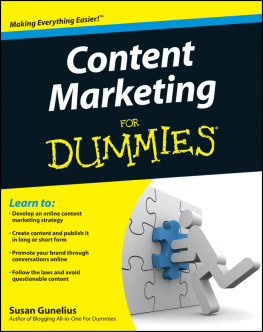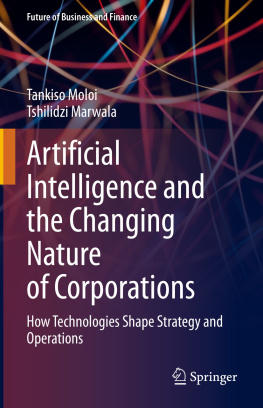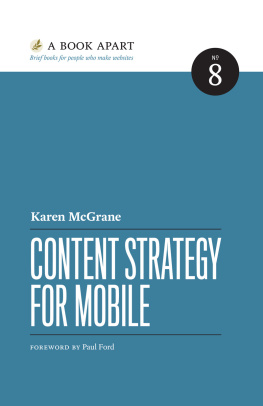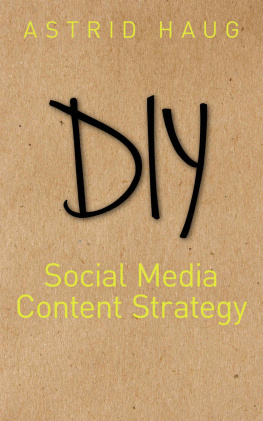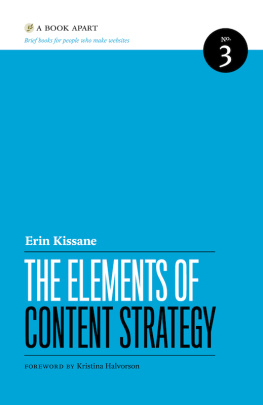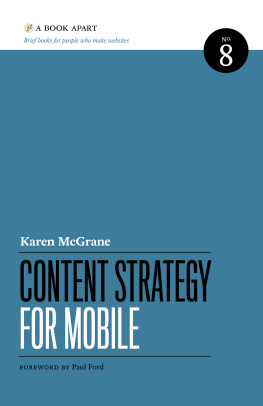Foreword
Stroll down the halls of any company, and you hear many languages: the language of engineering, the language of marketing, the language of finance, and others. These days, you also hear a new language. Its a formidable language, a language that transcends department silos, a business language that ties other business languages together in a powerful way. In a world where content is king, you might call this language the king of business languages. I refer, of course, to the language of content strategy.
Today, every business needs to be in the content business. Customers buyor dont buybased on their experiences with the information they pick up about a company and what it sells. So todays companies need people who think about information strategically, people who speak the language of content strategy.
What do content strategists do with this language? They use it to grapple with questions like these: What content meets our customers needs while also meeting our business goals? How much content do we need? What forms must it take? How do we keep it on brand? Which editorial and technical standards shall we follow? Which terms shall we use, and which shall we avoid? How do we assess the quality of our content? What metadata do we tag it with? Who manages it? Who creates it? Which pieces of content do we share, and which do we keep to ourselves? What tools do we use to produce and maintain all those pieces? What results do we want our content to achieve? How do we measure those results? How much content do we translate? Where do we distribute it? How often do we update it? When do we archive it? How do we socialize it, monetize it, search-engine-optimize it, reuse it, and encourage customers to contribute to it? How much content do we have, anyway?
These are big questions. To even form them, let alone answer them, we need a big language.
The language of content strategy is as big as they come. Governance . Taxonomy . Content audit . Words like these straighten your spine, square your shoulders, and steel your gaze. Words like these call for unifying, boundary-busting, big-picture vision. At the enterprise level, words like these touch on every department in the company and every phase of the content lifecycle.
Are you ready to think big about content? If so, youre ready to blaze trails down the halls (real or virtual) between editorial and technical teams. Youre ready to tie together all the languages you run into along the way. Youre ready to place equal weight on what goes into a companys content and what that content goes into. Youre ready to argue that stellar content has business value only if it gets to the right people at the right time in the right way and that a brilliant content-management plan has business value only if it delivers content that people care about.
If youre ready to think big, whatever your job titlewhether youre a budding content strategist eager to learn more about the role, a veteran curious about the way others use the terms you use every day, a manager looking to hire a content strategist, or a colleague desperate to decipher what your content-strategist pals are talking aboutyoure ready for the language of content strategy. Thanks to the efforts of Scott Abel, Rahel Anne Bailie, and all this books contributors, you now have access to this essential emerging lexicon.
Like any lexicon, this one perpetually evolves. Words have meaning and relevance only to the extent that people use them in ways they find meaningful and relevant. So go ahead, square your shoulders, and try out these words with your colleagues. See what meaning and relevance this vocabulary brings to your conversations. Think big enough to need the language of content strategy. Your companys future depends on it.
Marcia Riefer Johnston
Author of Word Up! How to Write Powerful Sentences and Paragraphs (And Everything You Build from Them)
www.howtowriteeverything.com
Preface
The writing of a dictionary is not a task of setting up authoritative statements about the true meanings of words, but a task of recording, to the best of one's ability, what words have meant to authors in the distant or immediate past. The writer of a dictionary is a historian, not a law-giver.
S. I. Hayakawa (from Language in Action, Harcourt Brace, 1940)
One aspect of having been in the workforce for over threeor in the case of one of us, fourdecades is that we get to watch professions spring up and mature. Information architects, interaction designers, web writers, content strategistsall professions that rose as quickly as others withered away into obscurity.
In the 1990s, we watched the discipline of information architecture spring up and take hold. In his essay on the history of the profession, Peter Morville recalls that web developers complained of a pain with no name. Information architecture may have alleviated that pain, but discussing information architecture created a new pain.
Negotiating deliverables was particularly difficult. Those conversations required a preamble wherein terms were defined. (What exactly do you mean when you say wireframe ?) These conversations were the only way to be absolutely certain that contractors or colleagues envisioned the same concept. Eventually, as the discipline matured, terminology became codified, and practitioners could fall into discussions with the shorthand efficiency that comes with community and experience.
In 2009, the awareness of the relatively new discipline of content strategy began to spill out into the greater business consciousness. And as we found with the sister discipline of information architecture, the vocabulary for content strategy is in flux. (What exactly do you mean when you say content audit ?) In a blog entry titled Dear Content Strategists , Lou Rosenfeld, one of the elders of information architecture, suggested that language and framing is critical early on. In all fairness, his statement was about creating an association, but can equally be applied to the vocabulary used to create community. Having a common vocabulary, an accepted lexicon, is an important aspect of a mature discipline.
To paraphrase a favorite professor: your world is limited only by your vocabulary. So we brought together fifty-two contributors, each defining a term that is important to them. From Ann Rockley, who invented the term intelligent content , to Eliot Kimber, acknowledged as an expert on transclusion , to Dr. Robert Glushko, who wrote the book on document engineering , and many others, we have gathered the best and brightest to contribute their expertise to this collection.
We are honored to be able to contribute to the discipline of content strategy by providing a baseline vocabulary for practitioners to use amongst themselves and with their colleagues and clients. This book is by no means meant to be the entire lexicon of content strategy; this book is meant to standardize the basic vocabulary and expand our professional worlds.
A common vocabulary is an important aspect of the maturation of a discipline. A lexicon helps professionals across all industries, from clients and colleagues who need common terminology to have effective conversations to internal stakeholders who have diverse technical backgrounds. (What do you mean by transclusion ?)
A lexicon helps hiring managers explain what theyre looking for in a job candidate and recruiters find the candidates most suited for particular projects. (Heres what my client expects from a content strategist.) It helps students who are discovering the discipline and helps instructors who need to convey concepts that will be understood in the marketplace. (What your employer will expect in a message architecture .)




